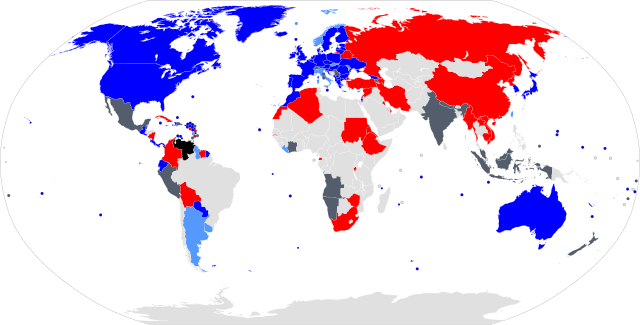Venezuelan presidential crisis
ongoing political crisis in Venezuela From Wikipedia, the free encyclopedia
Remove ads
Between 2019 and 2023 Venezuela experienced a Presidential crisis, with unclear leadership and terms of Presidency.
This article needs to be updated. (January 2024) |
Remove ads
Despite encouragement to resign as president when his first term expired on 10 January 2019, Nicolás Maduro inaugurated himself. This resulted in widespread condemnation. The National Assembly invoked a State of emergency. Nations removed their embassies from Venezuela. With their belief that his election was illegitimate, they claimed that by retaking power, Maduro was converting Venezuela into an illegal de facto dictatorship.[1][2][3][4]

Venezuela
Neutral
No statement
Recognize Guaidó
Recognize Maduro
Juan Guaidó, the newly appointed President of the National Assembly of Venezuela, began motions to form a transitional government as soon as he took the National Assembly role on 5 January 2019. Whether Maduro took office on the 10th or not, the country would not have a legitimately elected president.[5] On behalf of the National Assembly, he became one of the first to denounce Maduro taking office, saying that the country had fallen into a de facto dictatorship and had no leader,[6] and that they were in a state of emergency.[7]
Maduro's government said that the crisis was a "coup d'état led by the United States to remove him from power and control the country's oil reserves."[8]
Remove ads
References
Wikiwand - on
Seamless Wikipedia browsing. On steroids.
Remove ads


